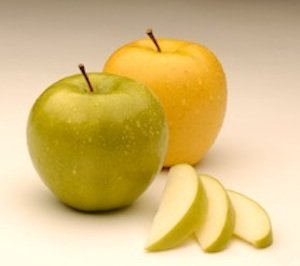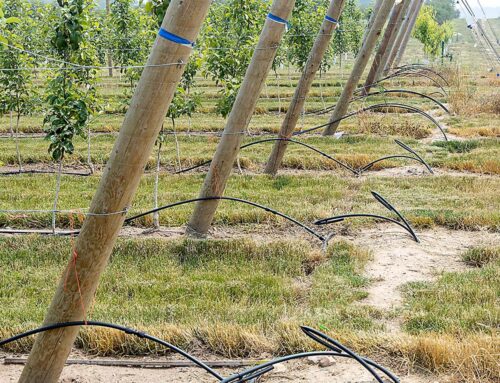
Non-browning GMO Arctic Granny and Arctic Golden. (Courtesy Okanagan Specialty Fruits)
To hear some critics tell it, the government’s decision Friday the 13th to deregulate a GMO apple was bad luck for growers and consumers. You could almost see the black cat crossing America’s orchards.
The U.S. Department of Agriculture said it would deregulate two apple varieties genetically engineered to resist browning. The controversial Arctic Granny and Arctic Golden varieties were developed by Okanagan Specialty Fruits of Summerland, British Columbia. Okanagan Specialty Fruits says the apples are completely safe and would appeal to consumers who want a non-browning apple.
Any genetic modification of food is intensely controversial with some groups who fear environmental or health effects, or fear a consumer backlash that would damage the apple industry.
GMO critics want an outright ban on genetic modifications or at least laws that label any GMO foods. Statewide ballot measures to require labeling have failed in Washington State, California, Colorado, and Oregon, but succeeded in Maine and Connecticut, according to a report in National Geographic. Congress is looking at a national voluntary labelling proposal backed by the GOP.
USDA’s announcement clears the way for commercial plantings in the U.S., meaning it’ll be a few years before any Arctic apples would be seen widely in supermarkets.
Okanagan President Neal Carter called the USDA approval “a monumental occasion,” adding that “we can’t wait until they’re available for consumers.”
Given the prominence and tenor of coverage of the USDA’s decision, it’s likely the Arctic apple will continue to be controversial within the apple industry. Critics likely will keep pressing their case with consumers.
Elsewhere on our web site, you can find comments by Todd Fryhover of the Washington State Apple Commission and Christian Schlect of the Northwest Horticultural Council.
Reaction on Good Fruit Grower‘s Facebook page (see link below) was generally negative, including this comment from a grower:
This issue is about consumer perception, not science. No matter how safe GMO technology has been shown to be, consumers don’t want it. I’m an apple grower and am completely opposed to this decision by USDA, as it will just point more bloody fingers at a crop that historically has had food safety perception problems. Thanks a lot, USDA.
Here’s what Good Fruit Grower reported Feb. 13.
And here’s a sampling of reports by news organizations:
But many executives in the apple industry say they worry that the biotech apples, while safe to eat, will face opposition from some consumers, possibly tainting the wholesome image of the fruit that reputedly “keeps the doctor away.” They are also concerned that it could hurt exports of apples to countries that do not like genetically modified foods.
Apple farmers are worried, however, that the Arctic apple will scare off consumers who can’t distinguish between modified and conventionally grown varieties. Several of them urged the Agriculture Department to reject the petition for approval.
The new Okanagan apples have drawn broad opposition. The Organic Consumers Association (OCA), which petitioned the USDA to deny approval, said the genetic changes that prevent browning could be harmful to human health, and pesticide levels on the apples could be excessive.
The OCA will be pressuring food companies and retail outlets not to make use of the apples, said OCA Director Ronnie Cummins.
Tests have shown genetically engineered foods to be safe but some opponents have pushed for laws that require such foods to be labeled so that consumers know what they are eating.
Carter doesn’t feel his company should be forced to use a GMO label.
“We’ve spent time and money on five years of regulatory work to prove and to demonstrate our product is as safe as any other,” he says. “Label it just like any other apple. We’ll have information at the point of sale, and we’re very transparent on our website. Let the consumer decide.”
Industry associations representing growers and packers of conventional apples, as well as environmental and food safety advocates, had opposed the move…The company also has plans to introduce genetically engineered cherries, peaches and pears.
We have good news for all of you who find browned apple slices unappetizing. It’s bad news, though, if you don’t like scientists fiddling with your food.
Resources
The USDA’s announcement
http://www.aphis.usda.gov/stakeholders/downloads/2015/SA_arctic_apples.pdf
US Apple Association
http://usapple.org/index.php?option=com_content&view=article&id=172&Itemid=268
To continue discovering new and valuable benefits from apples, USApple supports advancements from technology including genetics and genomics research. Benefits can include attributes such as quality, new varieties, new aromatic flavor profiles, improved pest resistance, and enhanced nutrition.
USApple supports consumer choice in the apples and apple products they select. Consumers will be able to decide whether to try the new, “non-browning” apples, and ultimately, the marketplace will determine whether there is a demand for them. Because it will be several years before Arctic® apples become available, consumers will have time to decide whether they want to purchase them.
Okanagan Speciality Fruits web page on Arctic Apples
Give the marketplace a chance: Third-party research suggests that consumers are in favor of genetically modified foods when the modification benefits the consumer. Our own consumer research also shows that not only are consumers interested in a nonbrowning apple, once they learn more about the science behind Arctic apples their interest in purchasing them increases further!
Good Fruit Grower Facebook page






Leave A Comment